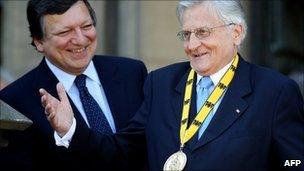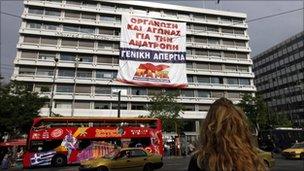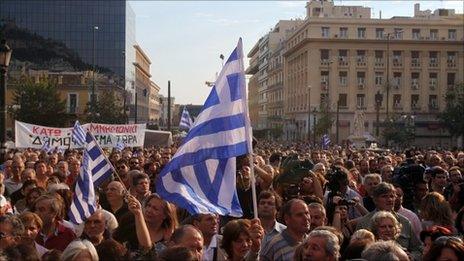Jean-Claude Trichet outlines his European dream
- Published
- comments

Mr Trichet made the speech as he collected a prize for European integration
Sometimes in public life a mask slips and for a moment behind those carefully weighed words you sense the real ambition.
It happened yesterday with the head of the European Central Bank, Jean-Claude Trichet.
The candid moment might have been because he was receiving the Charlemagne prize in Aachen for European integration or it may also be that he is nearing the end of his time running the bank.
In his vision, the crisis in the eurozone is an opportunity for a great leap forward towards ever closer union.
He suggests a European finance ministry that would oversee spending by national governments.
"In this Union of tomorrow, or of the day after tomorrow," he said, "would it be too bold, in the economic field, with a single market, a single currency and a single central bank, to envisage a ministry of finance of the Union?"
He recognises that such a 'quantum leap' would need a dramatic political change including a treaty change.
Tighter monitoring
Although he argued the precise opposite, the speech was a tacit admission that neither monetary union as it currently functions, nor the bail-outs that have followed, are working satisfactorily.
In his view, rules governing spending within the eurozone need to be tightened.
There are already plans for monitoring and peer review but Mr Trichet has in mind something "well over and above the reinforced surveillance that is presently envisaged".
When it comes to countries that have been bailed out but are still failing to get their deficits down he proposes that European officials essentially make the spending decisions on behalf of that country.
"One way this could be imagined," he said, "is for European authorities to have the right to veto some national economic policy decisions".
Question of trust
A vein running through this speech is the belief that governments can't be trusted with spending while officials can.
In this vision citizens and voters don't appear to have a seat at the table.
"Would it go too far if we envisaged," he said, "...giving euro area authorities a much deeper and authoritative say in the formation of the country's economic policies if these go harmfully astray?"
In some cases he sees European authorities taking decisions that would be compulsory for a country to follow.
'Interference'
Now, although some of these ideas were pitched way into the future some officials are already talking about taking decisions on behalf of Greece.

Protestors placed a banner calling for a general strike on the finance ministry building in Athens
Juergen Stark, who is the chief economist at the ECB, says that if Athens didn't take the necessary measures to restore its finances then it might be necessary for other parties to "interfere", as he put it.
"If countries in difficulty do not introduce the necessary adjustment measures," he said, "then interfering in their national policy could be a necessary way of ensuring the correct functioning of monetary union".
There are already daily protests in Greece against austerity measures that many see as being imposed from outside.
The suggestion that European officials might essentially dictate policies would be seen as a fundamental challenge to Greek democracy.
Unappetising change
Trichet's vision would require a change to the treaty. There is little appetite for that amongst member states.
Eight years were spent haggling over the Lisbon Treaty. Treaty change would trigger referenda and, in the present climate, it is not certain that Europe's voters would back more power shifting away from the member states.
It has long been said that you can't have monetary union without fiscal union. And you can't have fiscal union without political union.
Jean-Claude Trichet clearly believes that.
- Published3 June 2011
